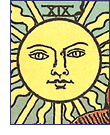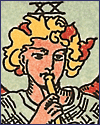|

Symbol systems are to be found in religious
contexts throughout theology. In the far east, Lamas believe in
an international code reliant on symbolism. The same system applies
to ancient Egyptians and Mexicans with their vast array of symbols
commonly known as hieroglyphics. Even Druids and other alternative
sects conveyed their message through the covert concept of symbols.
Tarot cards are no exception.
 It
is understood that gypsies in their flight from persecution embraced
the method of coding as richly as had been done centuries before
by other minority groups. This secret vehicle was pressured into
existence during medieval Europe where tolerance was at a new low
for alternative beliefs and teachings. Conveying coded meanings
became imperative as a sense of identity was being eroded. The use
of the tarot deck to maintain a sense of self was and still is being
utilised to this day albeit the covert nature of their meaning has
moved into the open. The coded images on a tarot deck gradually
shifted in time and place as the meanings became more fluid as the
deck was passed from one generation to the next. Interpretations
were twisted and in some cases removed to suit a specific need and
requirement. It is essential in understanding the tarot that these
shifts in meaning all form the esoteric nature of the cards, for
there is no true and finite meaning to any card. The basis has been
created from which to interpret but essentially the individual is
allowed to ascertain his or her own meaning from the symbols. It
is understood that gypsies in their flight from persecution embraced
the method of coding as richly as had been done centuries before
by other minority groups. This secret vehicle was pressured into
existence during medieval Europe where tolerance was at a new low
for alternative beliefs and teachings. Conveying coded meanings
became imperative as a sense of identity was being eroded. The use
of the tarot deck to maintain a sense of self was and still is being
utilised to this day albeit the covert nature of their meaning has
moved into the open. The coded images on a tarot deck gradually
shifted in time and place as the meanings became more fluid as the
deck was passed from one generation to the next. Interpretations
were twisted and in some cases removed to suit a specific need and
requirement. It is essential in understanding the tarot that these
shifts in meaning all form the esoteric nature of the cards, for
there is no true and finite meaning to any card. The basis has been
created from which to interpret but essentially the individual is
allowed to ascertain his or her own meaning from the symbols.
 Links
have even been made to the psychologist Jung who saw the mind being
formed out of four elements – intellect, intuition, feeling
and sensation. This fourfold composition reflects the four suits
of the Lower Arcana pack which have been associated with the four
natural elements of earth, air, fire and water. Understanding and
healing through the cards takes place through this four fold structure
as does Jungs theory of healing through contemplation. The interlocking
of the four suits across the 22 Major Arcana cards in itself creates
a symbolic language that communicates on an alternative plane. Detached
from the five physical senses the tarot helps to nurture and cultivate
the sixth sense of intuition. Links
have even been made to the psychologist Jung who saw the mind being
formed out of four elements – intellect, intuition, feeling
and sensation. This fourfold composition reflects the four suits
of the Lower Arcana pack which have been associated with the four
natural elements of earth, air, fire and water. Understanding and
healing through the cards takes place through this four fold structure
as does Jungs theory of healing through contemplation. The interlocking
of the four suits across the 22 Major Arcana cards in itself creates
a symbolic language that communicates on an alternative plane. Detached
from the five physical senses the tarot helps to nurture and cultivate
the sixth sense of intuition.
Symbol systems have surfaced throughout time and some owe more
to the tarot deck than is commonly known. For example German horoscopes
in the sixteenth century were created with visual depictions lifted
directly from images in the Major Arcana pack. During the Middle
Ages religious instruction was taken from visual representations.
Gothic cathedrals all contain such imagery in their structure, depicting
heaven and hell, gargoyles, saints and sinners. In an identical
manner pictures convey these messages and images on the tarot cards.
|





